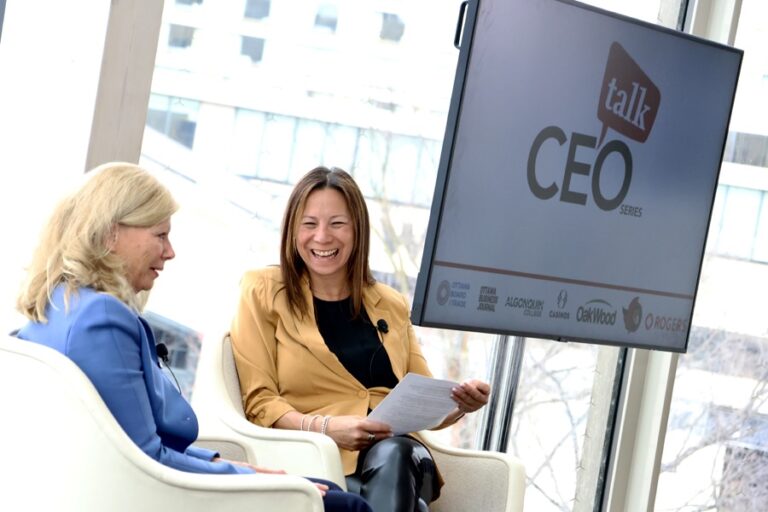We can’t give you a play-by-play of Monday’s business luncheon featuring Colette Watson but we can tell you that the president of Rogers Sports & Media covered all the bases, and then some, at the CEO Talk hosted by the Ottawa Board of Trade (OBoT) and Ottawa Business Journal at the National Arts Centre.
Watson has been leading the $2-billion business of roughly 4,000 employees since January of 2022, after she replaced former executive Jordan Banks. The company consists of a variety of sports and media platforms, including conventional and specialty TV channels, local TV stations, radio stations and podcast networks. It owns Sportsnet, which currently has the NHL broadcast rights in Canada.
Attendees heard how Watson joined Rogers in September 1990 after being hired away from the Canadian Cable Television Association by Phil Lind. He’s the board vice chair at Canadian multimedia giant Rogers Communications and was the right-hand man of the late Ted Rogers, founder and CEO. Watson identified both men as being her mentors.
OBJ360 (Sponsored)

Techopia Live: How startups can leverage SR&ED to boost cash flow and accelerate growth
Are you a tech startup that is starving for cash? Or are you an established company that is doing innovative research? How would you like to receive tens of thousands

How Red Rooster Golf makes golf tournaments memorable
Maybe you know the feeling. You’re on a golfing trip with your buddies, kitted out in new golf gear, only to find yourself digging in the bottom of your bag
Rogers Sports & Media is a subsidiary of Rogers Communications, whose assets include the Toronto Blue Jays.
“I made the big leagues; it was very exciting,” recalled Watson, who’s never forgot where she’s come from. “I was the French Canadian girl from the east end of Ottawa. I still am the French Canadian girl from the east end of Ottawa.”
Watson said her bilingualism helped her get ahead and led to “a ton of opportunities” at Rogers, where she’s held various senior roles, including senior VP of broadcast television and operations. Watson was most recently president of CPAC.

The CEO Talk gave the audience an opportunity to learn more about Watson during a Q&A held on stage with OBoT president and CEO Sueling Ching in the NAC’s scenic O’Born Room. Also on hand was OBJ publisher Michael Curran to deliver an Indigenous land acknowledgement, opening remarks and to properly thank sponsors.
Watson counts Malcolm Gladwell among her favourite authors, has learned the importance of advocating for herself, and tends to speak her mind more than she used to. “Something happens when you have your 50th birthday and your filter leaves you,” she joked.
The business leader also likes to focus on what she can change, and tries not to waste her energy on problems beyond her control. “One of the core values at Rogers is adaptability,” said Watson of what she views as a required skill for working in media. “Things don’t stay the same, and so you need to be able to adapt, to pivot, to redirect, and not have it drive you crazy.”




On the topic of the rapidly changing media landscape, Watson expressed optimism. “We’re lucky because humans, from the beginning of time until the end of time, will always want to be informed and entertained,” she said. “That will never change.”
What does concern her is the wider competition that they’re now up against. “We used to be competing against Global and CTV. Now, we compete against Google, YouTube, Instagram, TikTok, Facebook, and the list goes on. And their pockets are much deeper than ours.”
Being next to “the big elephant south of the border from us” presents huge challenges, Watson said of the United States. She spoke of a need for the national regulatory framework to be modernized and brought up to date, especially in today’s age of social media.
“I made a presentation to the NHL board of governors in December, and (NHL Commissioner) Mr. (Gary) Bettman asked me at the end of it, ‘What keeps you up at night?’. Amazon keeps me up at night because Amazon can come in and swoop those (NHL) rights right up from under me in three years, because they have way more money than we do.”
She emphasized the strong cultural relationship Rogers has with Canada, and its desire to tell the country’s stories. “We came to the party and we’re here to dance at this party but someone’s crashed the party and we would like for the host to understand that.”
Watson also spoke with Ching about her decision to reach out to Lisa LaFlamme, after she was let go last year as anchor of CTV National News. She subsequently hired LaFlamme as special correspondent to lead CityNews’ coverage of the death and legacy of Queen Elizabeth.
“It was the right thing to do, it felt so great, and I’m happy to say she killed it in the ratings,” said Watson, a former recipient of the Trailblazer of the Year award from Canadian Women in Communications. “She deserved to tell that story. So, if you can right a wrong and you’re able to, you should right that wrong, and that’s what we did.”
Replied Ching: “I felt that, from the outside I really felt that you supported her in a very public way.”
Yet, there remain obstacles to being a woman in leadership, said Watson, a results-oriented boss who, to use another of her sports analogies, likes to move things across the goal line.
“Sometimes — and most feminists in the room will scold me for this — if my pitch is going to be better heard if I get one of the men who works for me to pitch it, then I do that. It is not great … but, hey, I got the decision I wanted at the end of the day, and I’m pragmatic.
“I’d love for that to change some day.”
caroline@obj.ca





